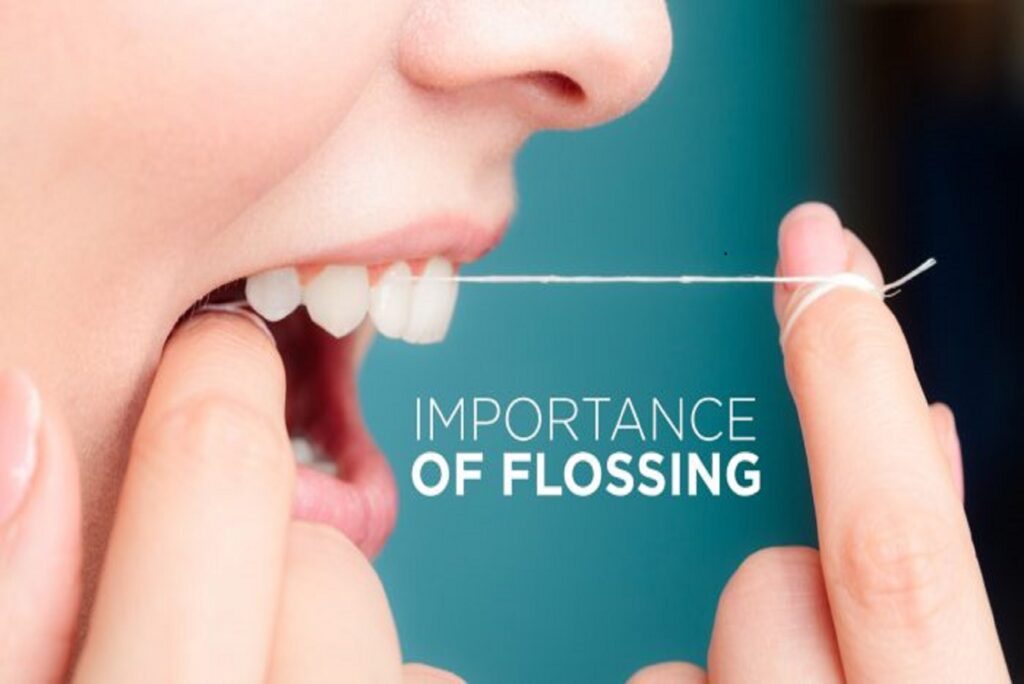Know the Importance of Flossing with Our Dental Clinic in Bilaspur
Karmanya DewanganOctober 11, 2023
Are you one of those people who diligently brush their teeth twice a day but often neglect flossing?
If so, you’re not alone.
Flossing is a crucial component of oral hygiene, and its significance cannot be overstated.
Our dental clinic in Bilaspur is dedicated to educating our patients about the importance of flossing and helping them maintain healthy smiles.
In this blog, we’ll explore why flossing is essential and how it contributes to your overall oral health.

Types For Importance of Flossing
1. Plaque and Tartar Control
The primary reason for flossing is to remove plaque and prevent tartar buildup between your teeth and along the gumline.
Plaque is a sticky film of bacteria that accumulates on your teeth and can lead to tooth decay and gum disease.
When plaque hardens into tartar, it can only be removed by a dental professional.
Flossing helps break up and remove plaque, reducing your risk of developing dental problems.
2. Preventing Gum Disease
Gum disease, also known as periodontal disease, is a common oral health issue.
Flossing is a vital tool in preventing gum disease, as it targets the areas where plaque and bacteria often accumulate.
By maintaining healthy gums through regular flossing, you can reduce the risk of gum inflammation, bleeding, and ultimately, more severe stages of gum disease.
3. Reducing Bad Breath
Flossing is a key player in maintaining fresh breath.
Food particles stuck between your teeth can lead to bacterial growth and result in bad breath.
Regular flossing helps remove these food remnants, promoting a healthier and fresher mouth.
4. Preventing Tooth Decay
Flossing doesn’t just benefit your gums; it also helps prevent tooth decay.
When plaque and food particles linger between your teeth, they can lead to cavities and decay.
Flossing ensures that you’re cleaning areas that your toothbrush might miss, reducing your risk of developing cavities.
5. Protecting Overall Health
Oral health is intricately connected to your overall health.
Gum disease, in particular, has been linked to various systemic conditions, including heart disease, diabetes, and respiratory infections.
By flossing regularly, you can reduce the risk of gum disease and potentially lower your risk of these associated health issues.
6. Saving Money in the Long Run
Prevention is always more cost-effective than treatment.
By incorporating flossing into your daily oral care routine, you can potentially save money on expensive dental treatments and enjoy a healthier, happier smile.
7. Enhancing Aesthetic Appeal
Flossing isn’t just about maintaining your oral health; it’s also about enhancing the aesthetic appeal of your smile.
Flossing helps prevent gum recession, which can make your teeth appear longer and less attractive.
A healthy, beautiful smile can boost your confidence and self-esteem.
8. Maintaining Dental Work
If you have dental work such as braces, bridges, or implants, flossing is even more critical.
It ensures that the areas around these devices remain clean and free from debris, reducing the risk of complications and the need for additional dental work.
FAQ: Importance of Flossing
How often should I floss?
Flossing should ideally be done at least once a day to effectively remove plaque and maintain optimal oral health.
Can I skip flossing if I brush my teeth regularly?
No, brushing alone may miss the spaces between your teeth where plaque accumulates. Flossing complements brushing for thorough oral care.
Is flossing painful?
Flossing should not be painful when done correctly. If you experience pain, it’s crucial to consult with your dentist to ensure proper technique.
Can flossing prevent bad breath?
Yes, regular flossing helps remove food particles between teeth, reducing bacterial growth and preventing bad breath.
Is it necessary to floss if I have dental work like braces?
Yes, flossing is especially important with dental work to keep areas around devices clean and prevent complications.
How does flossing contribute to overall health?
Flossing reduces the risk of gum disease, which has been linked to various systemic conditions like heart disease and diabetes, contributing to overall health.
Does flossing prevent cavities?
Yes, flossing helps prevent cavities by removing plaque and food particles from between teeth, areas that may be missed by a toothbrush.
Can I use alternatives to traditional floss?
Yes, alternatives like dental picks or water flossers can be effective. Consult with your dentist to determine the best option for you.
Is bleeding during flossing normal?
Occasional bleeding may occur, especially if you’re just starting. If persistent, consult your dentist as it could indicate gum issues.
Q10: Can flossing save me money on dental treatments? A10: Yes, preventive care like flossing can save money on expensive dental treatments in the long run.
Conclusion: Importance of Flossing
At our dental clinic in Bilaspur, we emphasize the importance of flossing as an integral part of your daily oral care routine.
We encourage our patients to seek professional guidance on proper flossing techniques and to ask any questions they may have about their oral health.
In conclusion, flossing is not just a recommended practice; it’s a necessity for maintaining a healthy smile. By making flossing a part of your daily routine, you can prevent dental problems, save money, and contribute to your overall health and well-being.
Don’t neglect this essential aspect of oral hygiene – visit our dental clinic in Bilaspur today and let us help you achieve and maintain a beautiful, healthy smile that lasts a lifetime.
Categories: blog_post